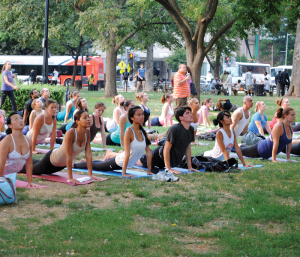
Washington, D.C., implemented a tax on yoga studios at the start of this month, upsetting many who argue that yoga is a spiritual exercise.
After the implementation of a 5.75 percent tax on health club businesses on Oct. 1, yoga studios in the District have continued to contest the tax, arguing that yoga is primarily a spiritual, rather than physical, exercise.
The D.C. Office of Tax and Revenue has defined a health club business as “a fitness club, fitness center or gym, the purpose of which is physical exercise.” Richard Karpel, president of Yoga Alliance, a national registry and trade association for yoga studios based in Arlington, Va., has spearheaded the opposition to the tax, disagreeing with the inclusion of yoga under “physical exercise.”
“It’s really a legal argument,” he said. “When you look at the law, it says nothing about yoga, it says nothing about yoga studios. What they’re taxing are health clubs, and health clubs are defined as places ‘the purpose of which is physical exercise.’ What we told the Office of Tax and Revenue, and it’s something we believe strongly, is the purpose of yoga is not physical exercise. This is not a crazy argument.”
The state of Washington excluded yoga from paying sales taxes in 2009, and New York did the same in 2012.
Patty Ivey, founder and director of Down Dog Yoga in Georgetown, agreed with Karpel about the important element of spirituality in yoga.
“Yoga is not just a fitness practice. It’s a fitness practice, but one mostly for fitness of the spiritual mind and the mental mind, so that it impacts people who have anxiety and depression and all sorts of avenues that it takes that other fitness programs do not offer,” Ivey said.
Ivey expressed concern that the tax would drive up prices at Down Dog and other studios committed to the core values of yoga, decreasing the reach of yoga’s mental health benefits.
“All the college kids that come to Down Dog, there’s a huge benefit of how they handle the stresses of what’s expected in school and from their parents and performing well and dealing with all of those anxieties,” she said. “My fear is that the college group in general may not come and make it important because dollars matter.”
Taylor Bond (COL ’18), who has attended yoga classes but now practices yoga independently, disagreed, explaining that for her and many others, yoga in practice is predominantly physical.
“For someone like me, it’s just like fitness,” she said. “I think yoga at its core is obviously more about the [mind-body] connection, but I think that, in modern society, people use it a lot more for just working out.”
Karpel acknowledged this popular opinion but urged people to look to instructors and ardent practitioners to understand yoga’s true purpose.
“We have 53,000 teachers that are registered with us. If you ask any of them … what the purpose of yoga is, not one of them is going to say physical exercise,” he said.
Yoga is often tied to religious practice, primarily in Hinduism. Hindu cleric Rajan Zed criticized taxation of yoga studios with yoga as a fundamental practice of the religion.
“Yoga was one of the six systems of orthodox Hindu philosophy whose traces went back to around 2000 B.C.E.,” Zed said in a statement. “Yoga was the repository of something basic in the human soul and psyche and regulating it was kind of a religious infringement.”
However, the Georgetown University Hindu Students Association remained unconcerned.
“No one on the board has a strong opinion about the tax,” HSA President Smiti Mohan (MSB ’15) wrote in an email.




















